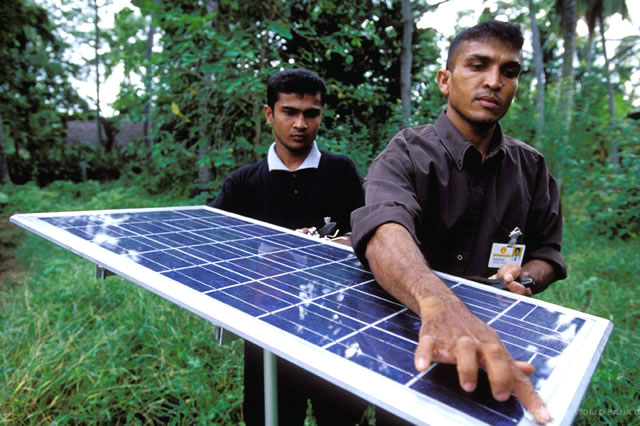Targeted approaches are necessary for the poorest and most vulnerable people to access sustainable energy.
At the start of June, the first annual Sustainable Energy for All (SE4All) Forum was held in New York. SE4All is a global initiative that aims to bring together top-level leadership from all sectors of society – governments, business and civil society to achieve a broad based transformation of the world’s energy systems and build a more prosperous, healthier, cleaner and safer world for this and future generations. The initiative was launched in September 2011 by UN Secretary-General Ban Ki-moon and has three interlinked objectives:
- Providing universal access to modern energy services;
- Doubling the global rate of improvement in energy efficiency; and
- Doubling the share of renewable energy in the global energy mix.
At present, 1 in 5 people worldwide have no access to electricity. SE4All offers an unprecedented opportunity to empower poor, vulnerable and marginalised people by providing them with essential and life changing sustainable energy services. Poor people have the right to development and it is in the interest of all if this development takes place using clean, affordable, sustainable energy.
Since its inception, Mary Robinson has been a member of the SE4All Advisory Board. The board is responsible for providing strategic guidance to the initiative; raising the profile of SE4All globally; and fostering collaboration between SE4All and other relevant initiatives. The Mary Robinson Foundation – Climate Justice also participates in the SE4All Energy Access Committee. The committee is charged with providing advice and recommendations to the Advisory Board and the Chief Executive Officer (CEO) to support the SE4All Initiative to bring about breakthroughs in approaches in achieving universal energy access.
The Access Committee has urged SE4All to change the narrative around the initiative so as to focus on the positive development outcomes arising from access to sustainable energy. The committee emphasised that sustainable energy can be an engine for positive development outcomes – contributing to improvements in sectors like water, health, education, the empowerment of women and good governance. Additionally, the committee called for a greater focus on the specific energy service needs of women in policy and programme design. In addition, the Foundation would welcome an increased emphasis on the empowerment of women through energy access.
Following the Forum in New York, Mary Robinson said “It is of the upmost importance that SE4All enables the world’s poorest people to access the transformative power of sustainable energy. All too often international initiatives for the global good fail to recognise that, without concerted and targeted efforts to reach the very poorest and the most marginalised, the benefits will never reach those who need them most.”
In order to achieve their goal of providing universal access to modern energy services, SE4All must now identify and champion innovative, targeted approaches that ensure the poorest households are not left behind. One such strategy, which has been researched and proposed by The Foundation, is to address the energy needs of the very poorest, those excluded from market solutions, by integrating access to sustainable energy into social protection services.
SE4All is about much more than just energy. It must serve as a cornerstone of the solution to the climate crisis. The recently published report of Working Group 3 to the 5th Assessment Report of the Intergovernmental Panel on Climate Change highlights growing energy demand as a main contributor to GHG emission growth and clearly states that decarbonizing electricity generation is a key component in achieving positive climate outcomes. By emphasising a people-centred approach, SE4All can contribute to the realisation and protection of human rights, including the right to food, health, water and shelter; share the benefits of sustainable energy with the poor and most vulnerable; and ensure a just transition to a low carbon world.
Related Links
Sustainable Energy For All – Official Website
The Foundation’s Policy Brief on the Gender Dimensions of Sustainable Energy for All
The Foundation’s Policy Brief on the Meeting the Energy Needs of the Poorest


